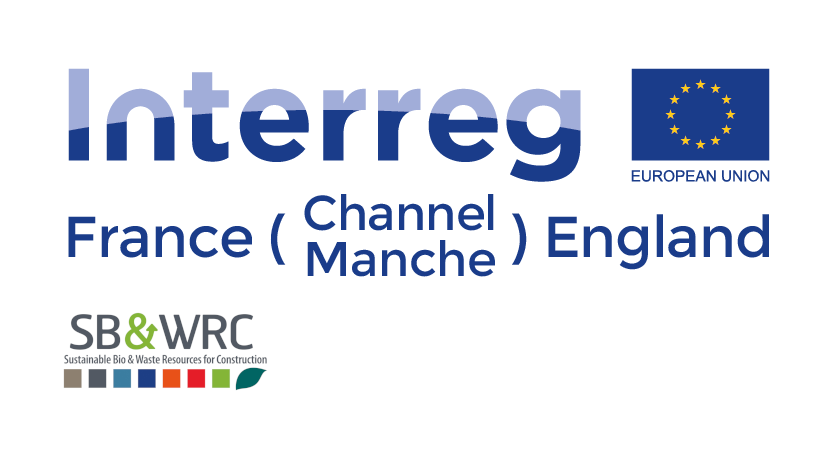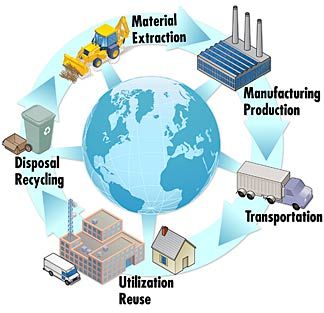From industrial manufacturing to distribution on the market
Create a subpage- Alexia ROBIN
- /
- the 01-03-2019
- / 1551
The SB&WRC project is part of the Programme Interreg VA France (Channel) England and benefits from financial support from the ERDF
 |
Financed by the ERDF through the territorial cooperation program Interreg France (Channel) England, the SB&WRC (Sustainable Bio&Waste Resources for Construction) project’s main aim is to conceive and produce three innovative, low-carbon, bio and waste based thermal insulants. The resources that were chosen for this project are:
- Prototype 1: maize pith;
- Prototype 2: polyester from used bedding;
- Prototype 3: wheat straw.
Estimating the economic and ecological potential of the prototypes
Technical experiments are currently being undertaken (see the articles from ESITC Caen and UniLaSalle) that will notably determine the thermal properties (thermal conductivity and transmittance) of the prototypes. In the meanwhile, the project partners are keen to prepare the next step: the transition to an industrial scale manufacturing and distribution on the market of the prototypes.

To achieve this, the project partners decided to operate in the following manner:
- Undertake Life Cycle Analyses (LCA) for each of the prototypes that will evaluate their carbon footprint and environmental impact and compare it to similar products currently available on the market. The University of Bath, the partner in charge of this activity, has already carried it out for their own prototype (Prototype 3) and is looking towards starting the two other ones;
- These LCA will enable the project partners to outline the value chain of each prototype: from the primary resources’ procurement (maize stalks, wheat straw or waste duvets), through the crucial steps of transformation into an insulant product, all the way to its distribution to clients and construction professionals and incorporate each of the transportation steps in between;
- The knowledge of the value chain will allow Nomadéis, the partner in charge of the project piloting, to proceed with an economic valuation of each prototype. This latter evaluation will lead to estimate of the production costs and, based on a benchmark, the possible sales prices and the associated margins;
- This economic valuation will first focus on the value chain as the academic partner have developed it, that is a small-scale sourcing and production and using experimental equipment. This baseline scenario will be completed by a prospective evaluation of the possible industrial development and change of scale potentials for each of the procurement, construction and transport steps of the value chain.
- In the end, this double analysis, economic and environmental, will enable manufacturers to foresee, in concrete terms, the large-scale production of these thermal insulants.
Promoting commercialisation of the prototypes
From the onset, the partners have believed in the potential of the insulation materials developed within the framework of the SB&WRC project. Thus, to encourage manufacturers to join in this venture, the partner have entrusted Nomadéis to develop a strategy that would help interested parties to mass produce and distribute the prototypes. This commercial strategy will notably contain:
- A sales prices comparison between standard and currently available thermal insulation products in sales network over the France (Channel) England region;
- Prospective scenarios for the commercial development of the SB&WRC prototypes that will take into account such factors as the design, the practical use characteristics, the format or the product guarantees;
- A SWOT analysis (Strength, Weakness, Opportunities and Threats) will also be conducted to compare the scenarios and to highlight the key factors to a successful commercialisation.
In the end, this report will allow decision makers and company representatives to transform the prototypes developed by the SB&WRC project partners into commercially viable construction and renovation products.
Mobilising construction professionals
In order to feed into the partners’ ongoing reflection on the improvement of the prototype, both qualitative and quantitative feedbacks from stakeholders of the building industry are essential. We had launched, in October 2018, on this very platform a consultation which aims to:
- Comprehend the economic actors’ perception of materials sourced from agricultural co-products and waste products in order for the project partners to conceive prototypes that match the sector’s expectations;
- Understand what would entice construction professionals to use the insulation materials developed within the SB&WRC project;
- Have an initial appreciation of the commercial potential of each of the developed prototypes.
If you are a stakeholder within the building industry, the SB&WRC partners are keen to hear from you. If you would like to participate in our survey, in English, please follow this link to the survey.
The questionnaire is strictly confidential, and your answers will remain anonymous. However, if you so wish, you may leave your email address at the end of the survey to be kept informed of its results.